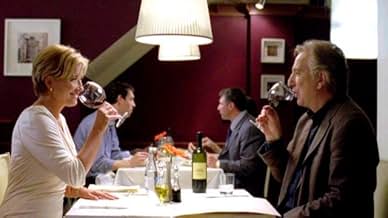The Song of Lunch: A Poetic Duet of Memory and Regret (2010) is a remarkable British television film that transforms poetry into a haunting cinematic experience. Adapted from Christopher Reid’s narrative poem and directed by Niall MacCormick, the film stars Alan Rickman and Emma Thompson in a powerful two-hander that delicately explores themes of nostalgia, unspoken emotion, and the enduring weight of past relationships. Through its lyrical prose, understated performances, and intimate direction, The Song of Lunch offers a uniquely poignant meditation on love lost and the unreliability of memory.
Set over the course of a single lunch in Soho, London, the film follows an unnamed man—simply called "The Poet"—as he reunites with his former lover, now living in Paris with her husband and children. He invites her to a restaurant they once frequented together, intending to impress her, perhaps win her back, or at the very least, confront the lingering shadows of their past. The narrative unfolds primarily through The Poet’s internal monologue, preserving the poem’s original structure while juxtaposing rich, descriptive language with the raw realism of a tense, silent meeting between two people who once shared everything and now share only discomfort.

Alan Rickman, in one of his most subtle and affecting performances, embodies The Poet with quiet desperation. His voiceover delivers Reid’s prose with bitter wit and aching vulnerability, allowing viewers to sink into his inner world while observing his outer awkwardness and failure. Emma Thompson plays the Woman with grace and restraint—her silences speaking volumes. Her presence challenges the Poet’s perspective and reveals the disparity between memory and reality. Together, they navigate a complex dance of politeness, suppressed emotions, and fleeting warmth, making every glance and pause resonate.
The film’s brilliance lies in its minimalism. With a runtime of just under an hour, The Song of Lunch maintains a tight focus, relying on the strength of the writing and the magnetism of its leads. The cinematography is elegant yet intimate, often isolating the characters in close-up as their expressions shift subtly between indifference and tenderness. Flashbacks blur with imagination, and moments of romantic idealism are pierced by the Poet’s self-loathing or the Woman’s bemused detachment. Wine is poured, meals are eaten, but the real substance is in what remains unsaid.

At its core, The Song of Lunch is about the human tendency to romanticize the past, and the painful realization that some things are beautiful only because they’re gone. The film does not offer resolution or redemption, but instead lingers in the ambiguity of what might have been. It speaks to anyone who has looked back at a lost love with equal parts longing and regret, only to discover that memory is a mirror that distorts as much as it reflects.

A poetic and profound piece of cinema, The Song of Lunch is a quiet triumph. It reminds us that some of the most powerful stories are not about action or drama, but about two people sharing a moment that once meant everything—and now means something else entirely.

